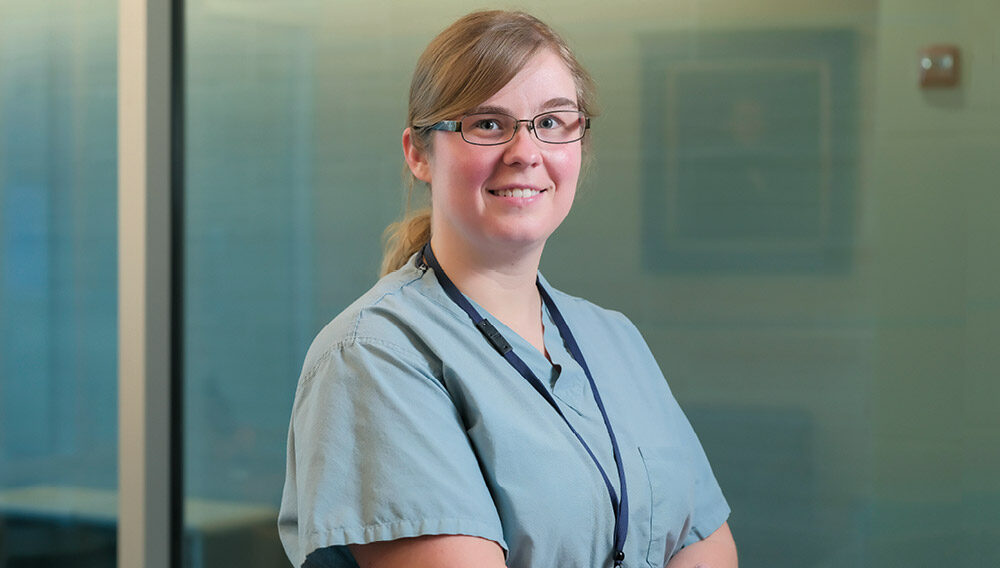Dead Men Do Tell Tales

Kathryn Komdat, a forensic autopsy technician and funeral director, makes sure they’re heard
When many people hear the word “mortuary,” “funeral home,” or “morgue,” they might think of horror movies and crime shows, and the hair on their arms may even stand up. For Kathryn Komdat of Averill Park, New York, it’s daily life. Komdat is a New York State-licensed funeral director and a forensic autopsy technician at Albany Medical Center, and her jobs are nothing like the movies or tv shows.
As Komdat puts it, she grew up around death. Her father has owned Perry-Komdat Funeral Chapel Inc. in Averill Park for 40 years, and Komdat has witnessed many wakes and funerals. She says that’s why she decided to pursue a degree in mortuary science from Hudson Valley Community College. While attending school, she worked in the ER at Samaritan Hospital in Troy, New York, from 2011 to 2016, but she found it hard to see people in dire situations. “I hated seeing people in pain, like in cardiac arrest. I hated that. I hated the in-between struggle,” she says. That realization led her to make a move to working in the Anatomical Gift Program at Albany Medical Center.
Albany Medical Center’s Anatomical Gift Program allows individuals to donate their bodies to medical science when they die. Komdat’s responsibility was to set up cadavers for dissections. After she began doing that, she discovered she had a real interest in it and wanted to pursue a new career. “Once I was dissecting bodies, I was like, wow, I want to do this in a forensic setting, because they’d do cases like murders, suicides, all that,” she recalls.
To make the career change, Komdat needed to go back to school to earn a bachelor’s degree. She learned about Excelsior College while researching online schools and discovered many of her credits from Hudson Valley Community College, would transfer to Excelsior. She earned a Bachelor of Science in Criminal Justice in May 2019 and took a job as a forensic autopsy technician at Albany Medical Center. “Without my bachelor’s degree, I probably wouldn’t have gotten this job,” she says.
In the Anatomical Gift Program, the cadavers were from adults 18 and older who willingly donated their bodies, but Komdat quickly learned that in the Albany Medical Center morgue, bodies came in from people, including young children, who didn’t have a choice in their death and sometimes met tragic ends. Surprisingly, although the job was new for her, the transition wasn’t difficult. “I’ve been around death my whole life: being in the mortuary, then doing the anatomical gift program, and now this—I’ve had steps to guide me. I feel like I wasn’t just thrown into it. Some other people get thrown into it,” she says.
Komdat enjoys working as a forensic autopsy technician because in some situations, such as with murders, examining a body is like solving a mystery. She works with the police often and sees many crime scene photos. That is part of what Komdat enjoys so much about her job: she likes learning the backstory of the people she comes across. As a result, she feels empowered as a final voice for the deceased victim.
In addition to her job at Albany Medical Center, Komdat works at her father’s funeral home and at both the funeral home and the morgue, she has seen an increase in volume. Komdat speculates this may be not only because of deaths due to the coronavirus but also due to drug overdoses.
Komdat says she wishes people knew more about what her jobs entail. She thinks that what is portrayed on television and in movies isn’t correct and says that a forensic autopsy technician and funeral director are underappreciated jobs. Komdat wants people to know that they’re important, albeit perhaps undesirable, jobs. She recommends that those interested in the field try them first to know for sure whether they are a right fit. Komdat knew they were the right fit for her after growing up in the field and having years of experience. Even though she explored other career paths, she knows with certainty that she was meant to work in this field.


